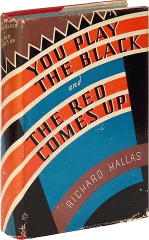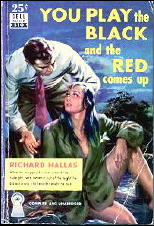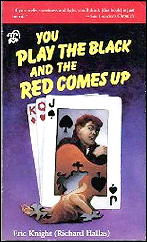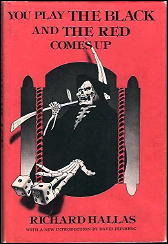Fri 14 May 2010
Reviewed by David L. Vineyard: RICHARD HALLAS – You Play the Black and the Red Comes Up.
Posted by Steve under Reviews[7] Comments

RICHARD HALLAS – You Play the Black and the Red Comes Up. Robert H. McBride, hardcover, 1938. Paperback reprint: Dell #510, 1951. Gregg Press, hardcover, Black Lizard Paperback, pb, 1986.
There is a type of novel that can only be called a peculiar classic, and by any standard this noirish Hollywood novel fits that category. Even more so when you know the pseudonymous Richard Hallas was better known by his real name, expatriate Englishman and member of the Hollywood Raj, Eric Knight.
Knight also wrote the classic novella “Lassie Come Home,” which spawned a long line of movies, television series, comics, and countless other media, and the inspirational wartime bestseller This Above All, which became a classic film with Henry Fonda, Joan Fontaine, and Thomas Mitchell.
But you wouldn’t know that from You Play the Black and the Red Comes Up (the title a reference to the roulette wheel — in this case an electronic one in a gambling joint — and the fickle nature of fate), a nightmarish tale that echoes both the American hard-boiled voice, Cornell Woolrich’s dark tales of obsession and implacable fate, and the Hollywood novel as it was developing when this was written in 1938.

The narrator is Dick Dempsey, just dumped by his wife Lois with whom he ran a diner. He’s landed on a west bound freight and his next stop is Los Angeles — which in this book may as well be the Twilight Zone.
And Dick can be forgiven if he feels that way because the Los Angeles he lands in is eccentric to say the least, from a sexually dubious film director named Quentin Genter; to a pair of psychopathic floozies; Sheila a nice girl, who still isn’t entirely sane (he meets her at 2 am on an empty pier where she has just taken a nude swim and is in no hurry to get dressed); and as fine a collection of crooked cops, grifters, tarts, and Hollywood staples as you can imagine in any single novel. Plus three murders, one robbery, a suicide, multiple love affairs (mostly illicit), a murder trial, and shots at everything from Upton Sinclair’s gubernatorial campaign to Aimee Semple McPherson.

As you might expect in this kind of tale, Dick ends up on death row waiting for death after breaking a few laws and getting framed for the one he is innocent of, but the ending still manages to be unexpected as Dick gets a reprieve from that fate to meet another and has a sort of epiphany as he escapes the California asylum.
Critical reception of You Play the Black and the Red Come Up was mixed, with some critics feeling Knight was slumming, aping the then new hard-boiled voice, but this a remarkably sustained effort, and the disparate elements compare well with Edward Anderson’s Thieves Like Us, Horace McCoy’s They Shoot Horses Don’t They, or James M. Cain’s novels, not to mention Nathaniel West’s The Day of the Locust, Fitzgerald’s The Last Tycoon, and Raymond Chandler’s The Little Sister.

Dick Dempsey’s voice is done in perfect pitch and never fails to be real and convincing, his journey, complete to its hallucinogenic end, the genuine thing, a true hard-boiled Hollywood novel of its period, and a genuine peculiar classic as well.
This is a hard one to find. The Gregg Press reprint with a fine introduction by David Feinberg is likely your best bet. Best of all, like a fly in amber, the book captures a slightly distorted but none the less true picture of Los Angeles in 1938 when movies were king and California still the golden land at the end of the dark and dusty Depression road.
Nathaniel West couldn’t — and didn’t — say it better.
May 14th, 2010 at 5:00 pm
The title has always been an enticement. I’ve had a copy of the Dell mapback since what seems like almost forever, and I’ve never read it. I also might have the Black Lizard paperback, but most of these I’ve never cataloged into my collection.
No matter. If it takes a review like this to get me to finally pull it off the shelf, then so be it!
May 14th, 2010 at 9:21 pm
This is one of my favorite books.
Must have read it five or six times.
The tone is somewhat uneven, swinging from fiercely earnest to broad and humorous.
But the best scenes are just so damn good.
There is a sequence in which the narrator, tough and clumsy but honest and sincere, is teased by his girlfriend into trying to tell her how much he loves her.
This is the most wrenching depiction of someone trying to say what they feel, trying desperately hard to find the right words to explain something too important for words, that I have ever read.
John Hocking
May 14th, 2010 at 11:55 pm
John, David or anyone
Do you know why or how it happened that Knight wrote only the one book in the same noirish vein as this? I assume the “Sam Small” books he wrote under his own name and also included in Al Hubin’s CRIME FICTION IV are nothing like YOU PLAY THE BLACK…
— Steve
May 15th, 2010 at 5:04 am
Sam Small, the ‘Flying Yorkshireman’ is really not in hard boiled the tradition of YOU PLAY THE BLACK AND THE RED COMES UP. They are closer to Thorne Smith than James Cain. Small is a clever little fellow in the tradition of Lord Dunsany’s Jorkens, known for his tall tales and fantastic and humorous adventures. There are just enough of the adventures in a criminous vein to justify being in Hubin though.
You can find more about Knight here http://www.lassiecomehome.info/ on the Eric Knight Home Page at the Lassie Family Home site with photos of Knight and some of his collies.
His novel THE HAPPY LAND Was made into a stirring WW II home front film with Don Amechee, Frances Dee, Harry Carey, and the debut of Natalie Wood directed by Irving Pichel and about a grieving father learning the meaning of the war from his son’s death, though he isn’t credited at IMDb.
As far as I know there is nothing else remotely like YOU PLAY THE BLACK AND THE RED COMES UP in any of Knight’s published works or screen contributions, all being either humorous, sentimental, or inspirational. Whether he would have written more in this vein if the war had not come along and he had lived we can’t know, but luckily we do have this one book.
In that it has always reminded me a bit of the Sherwood King novel that was the basis for Orson Welles film THE LADY FROM SHANGHAI, and that other peculiar Hollywood crime classic THE FACE ON THE CUTTING ROOM FLOOR.
Ironically LASSIE COME HOME was made in 1943, the year Major Knight was killed in a plane crash in North Africa.
May 15th, 2010 at 11:59 am
I read this book two years ago and loved it. It is impressive how well Hallas/Knight captures American vernacular. I wish he’d written more books like this. I see though, from the date of this death, that he didn’t have time to, should he have felt inclined.
Just an aside, you gotta love the internet for what it has done with bringing attention to old “forgotten” books. I have become aware of so many terrific books by following a half a dozen blogs. Books I probably wouldn’t have come across any other way.
Two other books I’d love to see reviewed here (if they haven’t been already) are Criss-Cross by Don Tracy, and Kiss The Blood From My Hands by Gerald Butler. As you know, David and Steve, both were movies. But, IMO both books are superior.
May 15th, 2010 at 8:44 pm
Frank
Good suggestions both. I’ve never read either book myself, and unless David or someone else beats me to it, I’ll dig my copies out and report back sometime soon, I hope!
— Steve
May 17th, 2010 at 4:08 pm
Okay, I was gonna re-read some Henry James this week, but after seeing this, I’ll go back to Hallas instead. Thanks.